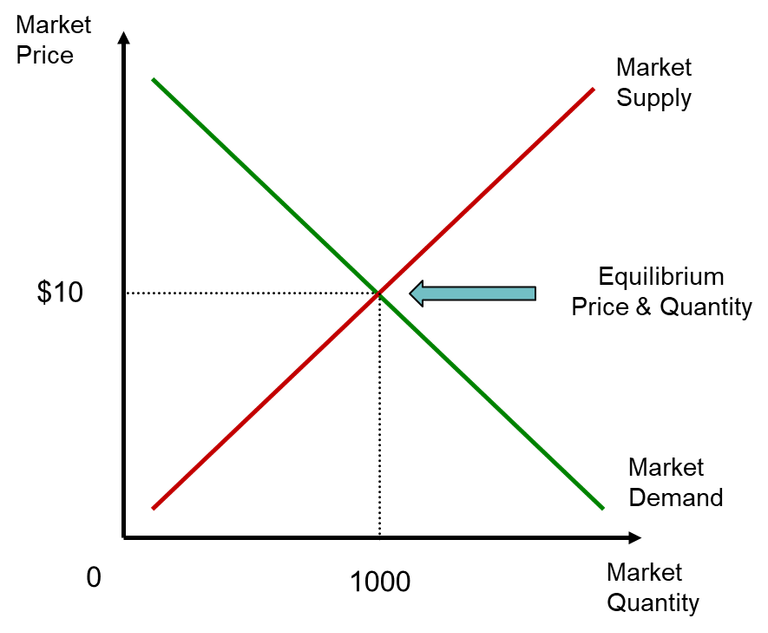
Image Source: https://www.economicsonline.co.uk/all/graph-of-perfect-competition.html/
Perfect Competition
I think that this chapter of Wealth and Poverty made an important connection between economics and entrepreneurship for me. I have only taken the basic macro and micro economic courses, and I hadn’t really thought about the connection of the supply and demand curves on entrepreneurship, especially for perfect competition. When I hear the term “perfect competition” it sounds like it would be great for entrepreneurs, since we’ve stressed that competition is one of the foundational principles. Although perfect competition is the idealized framework in economics, it is not ideal for new entrepreneurs. In an economy that theoretically had perfect competition, there would be no room for entrepreneurs. An equilibrium sounds like it would be ideal, but it actually leaves no room for actual competition. Although it is not plausible for an economy to have actual perfect competition, it was interesting to think about the lack of entrepreneurial potential in an economy that theoretically has perfect competition.
Supply and Demand
The discussion of supply and demand in this chapter was extremely interesting to me. I feel like I’ve always thought or heard that demand is what creates supply and keeps an economy going. This chapter made me realize that supply needs to be the priority over demand. There is no demand for a product that does not exist yet, so entrepreneurs need to create a supply in order to create the demand. I think it is interesting to try and look at supply as more of a priority than demand. When I took economics classes, they seemed of equal importance, so this chapter was able to change my mindset on which really benefits our society more. I’ve mentioned this in previous reflection papers, but I also need to work on seeing society and consumers as more than just a concept. Economies are always changing, as well as their tastes and preferences. They are not just a curve on a supply and demand graph. I think this is one of the ways that I’ve learned to appreciate entrepreneurship more throughout this class. They cannot look at a graph and decide what product to make, they have to take risks and figure out what consumers want before they actually have the demand for it.
Monopolies
I am still working on forming my opinion on monopolies. Everyone says that monopolies are bad, and they can be harmful to entrepreneurs, but I think this chapter helped me gain some more knowledge on how monopolies aren’t always evil. The module on robber barons made me conflicted because I don’t like the idea of monopolies, but monopolies can build economies and be beneficial to consumers. Some of Gilder’s ideas on monopolies were intriguing to me. He says that the essence of capitalism is the pursuit of monopoly, which I think is true. People don’t want monopolies to control industries, but the pursuit of them is the goal of business strategy and the goal of entrepreneurship. An important point that Gilder brings up is that monopolies will typically have short runs and then competition will catch up.
This quote by Gilder stuck out to me: “Economies grow in response to the enterprise of men willing to take risks, to transform ideas into monopolies, and monopolies into industries, and to give before they know what they will get in return”. I think this really brought together last week’s chapter and this week’s chapter. This progression was helpful for me in tying together multiple modules that we have gone over. I know that monopolies weren’t the point of this module, but this chapter added to the opinion I am trying to form about monopolies and their pros and cons.
Saving
Another point that stood out to me in this chapter was saving. I had never thought about how it can be destructive to an economy. I did not realize that when people save more and buy less, incomes can collapse. This is because demand and investment fall, and people can end up with less money to save than they did before. When I think about saving money, it always sounds like a good idea, but it is not good for the economy if everyone does it. It does work when people invest their money, but leaving it sitting in the bank instead of investing or spending can be detrimental. Gilder says that people feel power when their incomes are liquid, but they don’t realize that the fall in demand will reduce total income. I found it interesting that this concept of saving can also be applied to the government. Even with forced saving by taxation, if a government does not invest, total income will also decline. This investing should also have the goal of economic and social benefits, rather than pleasing people politically.
I think that these two chapters of Wealth and Poverty had a huge impact on my views of entrepreneurship and economics, and how they are connected. I’ve taken classes in both before, but these chapters have helped me see how intertwined they are. Looking at economics from an entrepreneurial point of view has made me realize how much more complex supply and demand are. Supply and demand are the biggest factors between both of these subjects for me, so looking at them from a different perspective has been extremely helpful.
Congratulations @mloy0921! You have completed the following achievement on the Hive blockchain And have been rewarded with New badge(s)
Your next target is to reach 100 upvotes.
You can view your badges on your board and compare yourself to others in the Ranking
If you no longer want to receive notifications, reply to this comment with the word
STOPCheck out our last posts:
Support the HiveBuzz project. Vote for our proposal!